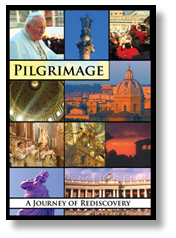Why I’m Proud to Be Catholic
Pilgrimage, A Journey of Rediscovery:
See the renaissance of traditional Catholicism on DVD.
Hear (then) Cardinal Ratzinger speak -- before he became Pope Benedict XVI.
© Jack Cashill
WND.com - August 22, 2018
About ten years ago, Bishop Robert Finn, a saintly man and orthodox priest, asked me to serve on the panel that would select the next superintendent for the Catholic schools of his Kansas City-St. Joseph diocese.
It was a bold move on the bishop’s part. He had recently inherited a spiritually liberal diocese that had predictably been much too cozy with the local Democratic Party.
Not the best of Catholics myself, I had wandered in a desert of my own making for more than twenty years and found my way back to the Church only through the portal of traditional Catholicism. Just as problematic for the bishop, I was known to vote Republican.
After my fellow panelists had peppered our first candidate with the kind of questions he expected, I asked my first question, “Why are you proud to be Catholic?”
“Deer in the headlights” does not do justice to the look the man gave me. It was more like the ‘uh-oh’ look teenagers flash cops when rousted at a lover’s lane.
He panicked. After a moment of stuttering indecision, he finally said, “Diversity?”
My fellow panelists, none of whom I knew, were as surprised by the question as was the candidate. After he left the room, they asked what kind of answer I hoped to hear.
I said that setting the spiritual part aside for a moment—admittedly a rather significant set-aside—the Catholic Church was the indispensable player in the creation of western civilization.
This was not coincidental. It was the Church’s dissemination of traditional Judeo-Christian moral order throughout the western world that enabled the civilization to take hold.
I talked specifically about an historic turning point on the scientific front that had taken place in Toledo, Spain, in the 12th and 13th centuries.
The Christian knights of the Reconquista period had lately—and rather civilly—repossessed the city from its Islamic placeholders.
There, in the city’s cathedral, a polyglot crew of Muslim, Jewish, and Christian scholars labored away in surprising harmony, translating into Latin the works of the great Greek philosophers that had earlier been translated into Arabic.
Richard Rubenstein, author of the impressive Aristotle’s Children and not likely a Catholic apologist, calls the eventual outcome of this gathering “an acute source of embarrassment” for many modernists.
As it happened, Jews and Muslims would turn their backs on this treasure trove of admittedly pagan scholarship, and “farsighted popes and bishops therefore took the fateful step that Islamic leaders had rejected.” They understood that faith and reason were compatible.
Not without a few speed bumps en route, the Catholic Church rode away with the goods. Historian Edward Grant calls the medieval Christian renaissance that ensued “the best kept secret of Western civilization.”
The art and the architecture my fellow panelists knew about. They knew less about the Catholic role in the creation of universities, the rule of law, the scientific establishment, and the world’s most powerful economic engine.
Had there been scandals along the way? Of course there had. The first pope, Peter, had denied Christ three times. His life came to represent the struggle of a deeply spiritual man to overcome his human fallibility.
The economic infrastructure unique to Christendom allowed the German Catholic Johannes Gutenberg to create a commercially viable printing press early in the 15th century.
The spread of information led to major fractures within Christendom. It also led to disinformation. The breakaway Protestant sects had a vested interest, for interest, in portraying the Catholic world of the past as the “dark ages” or worse.
Then all of Christendom took it on the chin as the soi-disant “Enlightenment” swept Europe. Man had officially become wiser than God. With disinformation as their weapon of choice, Mao and Stalin and Hitler proved there were few limits to man’s “wisdom.”
Beginning in the 1960s if not earlier, that wisdom infected the mainline churches, the Catholic Church included. For some, the words of Christ and the Gospels, like the Ten Commandments before them, were seen now as suggestions.
Orthodox Christians and Jews, on the other hand, know what the rules are and know when they have been violated.
As inheritors of the world’s greatest culture—a culture created and sustained by adherence to a traditional moral order--they have every reason to be upset when that order is sabotaged from within.
As to those who play by their own rules, who insist that morality is relative and truth unknowable, they can take a hike.
For the record, we asked the next ten candidates why they were proud to be Catholic. They gave answers no better than the first guy. We hired none of them.
Some education is in order.

Jack Cashill

